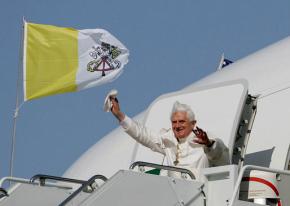Blurry outlines of the Holy See
Irish socialist describes how the Catholic Church is protecting Vatican officials who knowingly aided abusers in escaping prosecution.
NOW YOU Holy See him, now you don't.
One minute, Benedict XVI is a head of state, like Elizabeth II, Omar al-Bashir or Emperor Akihito. Then, in an instant, shazam! He's the leader of a religious organization, on a par with the Dalai Lama, the Archbishop of Canterbury, the Rev. Ron Johnstone.
Maybe he can't be in two places at the one time, but he can be two personages in the one place.
His sojourn to Britain, beginning on Thursday next week, will have the status of both a state visit and a pastoral journey. On some stopovers, he will be the representative of a state recognized at the UN and enjoying diplomatic relations with, at the last count, 156 countries. His role at other engagements will be as leader of a religion with 1.2 billion followers scattered across the planet.
The potential political advantages of this double status are fairly obvious. But it does raise the question: How come? Why is it that, uniquely among religious leaderships, the Holy See can also bestride the world of diplomacy and politics?

The common explanation is that the Pope has head-of-state status because he's the top representative of Vatican City, the 108.7-acre independent jurisdiction enclosed within Rome. But not so.
If Vatican City were a nation-state like any other, its internal regime would be a human rights scandal. Saudi Arabia, China and, certainly, Iran are beacons of freedom and equality by comparison.
But the Vatican is never cited for these human rights violations at the UN or when the Pope meets with representatives of other states. One reason for this is that it's not Vatican City which is recognized as a state, but the Holy See, an altogether less corporeal affair.
THE HOLY See has existed in one form or another since the early days of Christianity, whereas Vatican City came into existence only in 1929, as a result of the Lateran Treaty between the Holy See and Mussolini's fascist regime.
Whatever the confusions in the outside world, the two entities themselves have always made their distinct and separate existences plain. The Holy See refers to the global government of the Catholic Church--the Pope, the curia, the radiance of cardinals and bevies of bishops. It has no territorial expression.
One of the advantages for the church of its split personality is that it can switch from one alias to the other as needs arise.
Responding to attempts by lawyers for victims of clerical child abuse to compel it to answer for its role in covering up crimes and facilitating the escape of alleged perpetrators, the church has been able to revert to its status as a state and to claim diplomatic immunity. In the U.S., church lawyers cite the Foreign Sovereign Immunities Act (FSIA).
There are signs, however, that this stratagem might not wash much longer. In Washington in June, the Supreme Court declined to hear an appeal from the Church, which was claiming immunity in the case of John V. Doe v. the Holy See.
The ruling was on a matter of procedure, not on substance--but even so, it was a step on the way to removing the protection of the FSIA from the church. Among the first to welcome the ruling was attorney Daniel Shea, representing one of three boys who say they were sexually molested by seminarian Juan Carlos Patino-Arango. The seminarian fled from Texas after being indicted.
Shea argues that Benedict, as Cardinal Ratzinger, the head of the relevant congregation within the church, had been involved in "a conspiracy to hide Patino-Arango's crimes and to help him escape prosecution." He quotes Ratzinger's May 2001 letter to bishops warning that church investigations of clerical sex abuse were to be reported direct to his office, not to the secular authorities.
The church is now arguing that Ratzinger/Benedict cannot be called to account by U.S. courts because he represents, in legal terms, not the church which employed Patino-Arango and put children in his care and then helped him flee the scene of his alleged crimes, but, rather, a state which has diplomatic relations with the U.S., from which flows an entitlement to immunity.
The church's dual status suits its broader ambitions, too. It has used its position at the UN--which it simply assumed and which has never been endorsed by vote--to throw its weight around at international gatherings like a minor superpower, making common cause with Protestant fundamentalist interests and Islamic states, particularly in relation to gay rights and women's rights.
The only sustained challenge to the church's devious behavior in these matters appears to come from lay Catholic groups in the U.S. Strange.
First published in the Belfast Telegraph.


